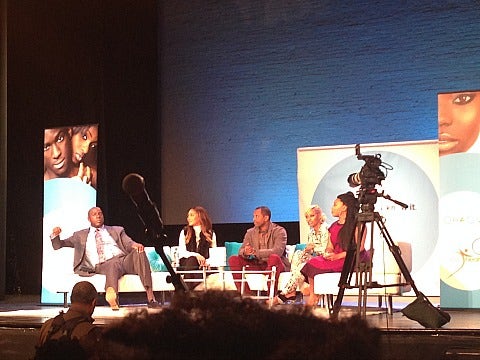
This year's theme is "Shared Responsibility: Strengthening Results for an AIDS-Free Generation."
By Michelle Toglia — Written on Nov 29, 2013

World AIDS DAY, held on December 1 every year, launched in 1988 as a chance for people across the globe to come together in the fight against HIV through spreading awareness and providing support for those affected. The first World AIDS day was established right after C. Everett Koop's research on AIDS, an eight-page document, "Understanding AIDS," was mailed to every household in the U.S.. It was the first ever global health day, and 25 years later, it continues to be a day for fundraising events, learning more about AIDS and taking actions to fight prejudice and help erase the stigma and discrimination. To encourage education and the conversation around AIDs, this year's theme is "Shared Responsibility: Strengthening Results for an AIDS-Free Generation."
To show support today, wear a red ribbon, the international symbol of HIV awareness and support.
How Far We've Come
The first cases of the virus were first reported in 1981, but as deadly as it was, the epidemic wasn't acknowledged in public until 1987 by the United States government. Since 1981 around 75 people have become infected and 25 million people have died from AIDS throughout the world. Today there are 33.4 million people living with HIV/AIDS, but the disease isn't the death sentence it once was.
According to CNN, new HIV infections have decreased by 33 percent since 2001. From understanding the disease more (it was originally called GRID, gay-related immune deficiency because it thought was only to affect homosexual men) to creating laws to protect people living with HIV to advances in treatment (in the mid-1990s, antiretroviral therapy greatly extended the life expectancy of people living with HIV and caused a dramatic drop in AIDS deaths, and now "functionally" cured of HIV is now a reality for some HIV patients), we've come a long way in fighting against the disease. In 1988, the only drug available to treat HIV/AIDS was not very effective, and it cost thousands of dollars. Today, the treatment is better, costs less than a dollar a day and allows people with HIV to live much longer, more productive lives.
Even testing for HIV is now available. With OraQuick, an over-the-counter test, you can find out your status in the privacy of your own home in just 20 minutes. A new study released by The ONE Campaign suggests that we're on our way to an AIDS-Free generation, and if current rates of progress continue, "the beginning of the end of AIDS" could come as early as 2015.
What's Next?
But even through these improvements, there's more work to be done. Awareness is key, and in the spirit of this year's theme, it's everyone's job to not only learn more about the disease and get tested, but also to talk about it with friends and family — for your health and the health of others.
On November 19, we attended the "Life. As We Know It" discussion at at The Apollo Theater in New York City, where panelists, including Earvin 'Magic' Johnson, La La Anthony and sexologist Dr. Rachael discussed awareness for HIV testing and prevention.
Magic Johnson, who told the world about his HIV status on Arsenio Hall's late night show in 1991, has since become the face of the disease. His major announcement encouraged many people to get tested at the time. "Now, 22 years later, we need to raise that awareness again," Johnson said.
What made that annoucement so effective? Johnson says it was powerful to see two black men speaking with each other so honestly. He says that this atmosphere of trust and encouragement is so important when you're talking about HIV — and he had that type of environment with his good friend Arsneal.
"No one can deal with a disease alone," explained Dr. Rachael. And it's not just when you're revealing your status that you need to feel comfortable sharing thoughts, this how you get the community talking and educating each other too.
"When a person knows they can share whatever and love will not be lessened — and could even be increased — they will be open," explained panelist Pastor Touré Roberts. He believes this is what will decrease the spread of HIV.
While HIV can affect anyone, the largest number of new HIV infections occurs in men having sex with men, followed by African American heterosexual women. Dr. Rachael said this is because there's a lot of partner-sharing in the African American community. She explained that conversations about the disease need to go far beyond 'wrap it up and get tested.'
Related Stories From YourTango:
Instead, the dialogue surrounding HIV/AIDS needs to start around sex and relationships. The "conversation needs to be about trusted monogamy," said Dr. Rachael.
The panelists and audience all agreed it's common for people to stop using condoms once they've been seeing someone for a while, but yet they never ask their partner to get tested. And it's true. If we're comfortable enough to sleep with someone, asking our partner to get tested shouldn't be an issue — and it's something you both can do together. To "move to zero," zero deaths and zero infections, we need to erase the stigmas around the disease, educate each other on transmission and prevention and get to a point where it's not taboo for partners to ask each other to get tested.
More juicy stories from YourTango:

